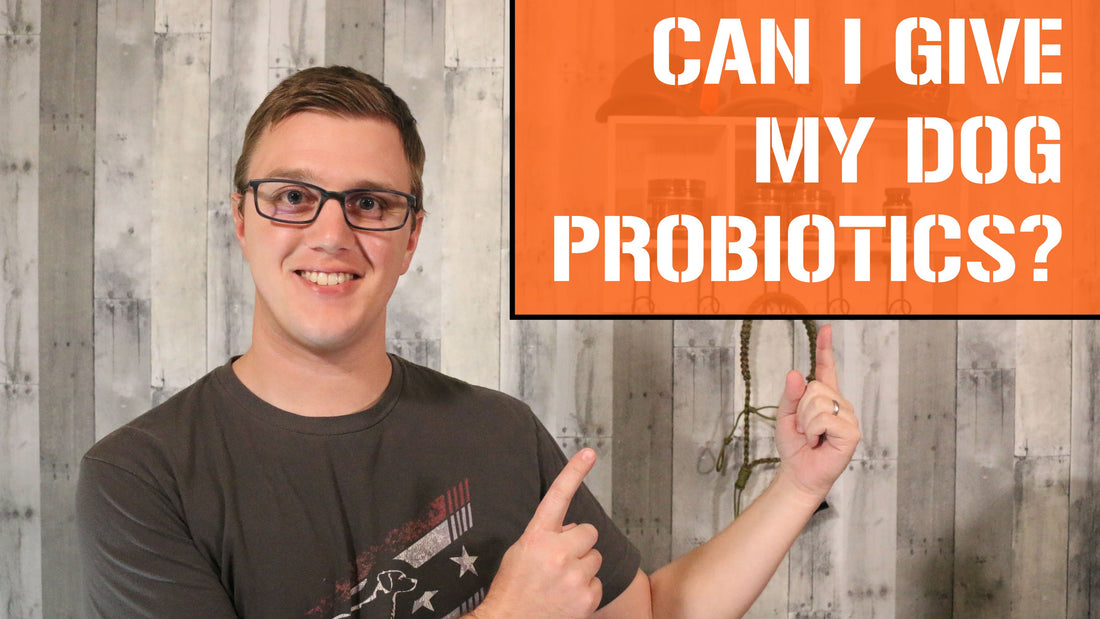
Can I Give My Dog Probiotics?
Is your dog suffering from digestion or immune system issues? If so, you may be waiting to ask your veterinarian the question "Can I give my dog probiotics?" The short answer is absolutely, but there is a bit more to it than that. We'll break down the 5 most important things to know about giving your dog a probiotic supplement.
Can I Give My Dog Probiotics?
As I mentioned before, you not only can give your dog probiotics, but it is actually a great idea to do so! There are many benefits to giving your dog a probiotic supplement that we'll dive into in a bit, but for now just know that they help with far more than just digestion.
Probiotics are perfectly safe for dogs, and oftentimes are considered one of the first lines of defense by veterinarians when it comes to stomach issues for your dog. Probiotics are commonly recommended by veterinarians, dog trainers & breeders, & nutritionists alike. Even without having an ongoing stomach issue, a dog can greatly benefit if you give your dog probiotics on a regular basis.
With that being said, there are 5 things that we are going to talk about to fully answer your initial question - Can I give my dog probiotics?
- Good Bacteria vs Bad Bacteria - How Probiotics Work
- How Are Probiotics Measured?
- Dosage of Probiotics For Your Dog
- Benefits of Probiotics For Your Dog
- What Dogs Should Take Probiotics?
Good Bacteria vs Bad Bacteria - How Probiotics Work
At first glance, probiotics may seem a bit counterintuitive. The first thing that you need to understand is that in the digestive system there are both good and bad bacteria. The good bacteria help with things like digesting food & fighting off illnesses. If a dog is 100% healthy, that essentially means their digestive system is producing enough good bacteria to fight off the bad.
A probiotic is essentially a blend of different types of this "good bacteria". When you give your dog a probiotic, the goal is to essentially overwhelm the bad bacteria with the good bacteria of the probiotic. This boost of the good bacteria in the gut of your dog allows them to digest food more easily, as well as fighting off any illnesses & bugs that may have found their way inside.
I don't know about you, but my dog tends to eat& drink pretty much anything and everything - regardless of whether or not it should be eaten. Whether that means food that my two year old throws off the table or a muddy puddle on a hike, to say he ingests some questionable things would be the understatement of the century. That's why I always make sure he gets a probiotic once a day (I opt for the morning) to help fight off whatever it is he decides to eat that day.
We could dive considerably deeper than that, but I don't want to get you lost in the weeds. Just know that a probiotic works by essentially overwhelming the bad bacteria in your dog's gut with the good bacteria in the probiotic.
How Probiotics Are Measured
Once you have a general understanding of how probiotics work, the next step is to understand how exactly they are measured so you can select the correct dosage for your dog. As I mentioned before, a probiotic is basically a "blend" of good bacteria for your dog. The thing is though, these bacteria are pretty darned small, and there are dozens of billions of bacteria living inside your dog.
For that reason, it's easy to understand why a standardized measurement system was needed for the probiotic industry. Over time the measurement of CFU, or Colony Forming Unit, was developed. Typically you are going to see probiotic supplements advertise that they have millions, or even billions, of Colony Forming Units per serving.
As you're asking the question "Can I give my dog probiotics?", it is also important to take note of the number of strains of bacteria that the probiotic contains. A high CFU count in a probiotic doesn't really help your dog if they happen to already have a healthy number of that particular strain. When you are selecting a probiotic for your dog, diversity in the strains of bacteria that the probiotic contains is critical.
For example, our probiotic for dogs that we developed here at Alpha Dog Nutrition (Balance) contains 6 billion CFU's per serving. We did that so that we can overwhelm those bad bacteria in your dog's gut to keep them as healthy and active as we possibly can. We spent months formulating Balance to incorporate 7 difference strains of healthy bacteria, at over 6 billion CFU's per serving. The 7 different strains ensure that your dog has a variety of healthy bacteria ingested into their system, giving you the best possible chance of successfully helping your dog.
Make sure you do your research on probiotic labels & information before purchasing one for your dog. While you can't really get a probiotic that harms your dog (assuming it is a legitimate probiotic), you can certainly waste your money on an entirely ineffective product.
Dosage of Probiotics For Your Dog
While nutritionists, biologists, & veterinarians have a good understanding of how probiotics help dogs, there is a bit of a debate on dosage. The general consensus is that since it is impossible for a dog to overdose on a probiotic & they are completely ineffective if you don't overwhelm, it is best to have a larger dosage for your dog.
Using our Balance probiotic from Alpha Dog Nutrition as an example again, we recommend a single 3 CC scoop of our probiotic sprinkled on your dog's food once daily. This gets your dog those 7 different strains of bacteria at a dosage amount of 6 billion Colony Forming Units.
Benefits of Probiotics For Your Dog
There are a few other major benefits that your dog will experience after taking a probiotic on a regular basis.
Immune System Boosting Effects of Probiotics
One of the seriously underestimated benefits of probiotics for your dog is it's ability to boost their immune system. Probiotics often have a reputation for only being something you turn to when your dog is having digestive issues. When your dog has a healthy gut though, it's entire body is going to feel the benefit of that.
Don't get me wrong, it all boils down to keeping your dog's bowel movements regular & keeping things moving through them. By having regular bowel movements, you allow your dog to keep that unhealthy bacteria moving through their system. This has obvious benefits, and it keeps the dog's immune system from having to work too overtime.
Spring To Their Step
Ever notice how after your dog goes to the bathroom, they end up walking around like they are 5 years younger? There is a reason for that, and it's because getting rid of that waste makes them lighter & more limber! Keeping your dog regular gives them that bit of a spring to their step & feeling great!
Boost Their Metabolism
By providing billions of extra healthy bacteria to your dog's digestive system, you are going to make it more efficient. This results in a boost to your dog's metabolism, helping them maintain a healthy weight moving forward!
What Dogs Should Take Probiotics?
So this is going to come off as a sales pitch because we sell a probiotic, but hear me out. ALL dogs can benefit from a probiotic supplement. To give a bit of a backstory, we created Alpha Dog Nutrition's Balance probiotic for dogs as a result of a need in the market, not as a way to push more product sales.
So unless your dog can't benefit from a healthier digestive system, a stronger immune system, increased metabolism, and just a general boost in how they feel, you should definitely be giving your dog a probiotic!










